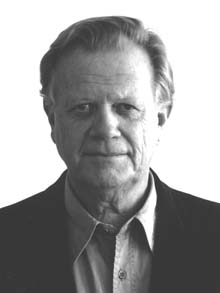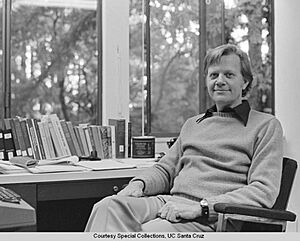Hayden White facts for kids
Quick facts for kids
Hayden White
|
|
|---|---|
 |
|
| Born |
Hayden V. White
July 12, 1928 |
| Died | March 5, 2018 (aged 89) |
| Academic background | |
| Alma mater | University of Michigan |
| Influences |
|
| Academic work | |
| Discipline | History |
| Doctoral students | Nancy Struever |
| Notable students | Lawrence Grossberg |
| Main interests | Metahistory |
| Notable works | Metahistory (1973) |
| Notable ideas |
|
| Influenced |
|
Hayden V. White (born July 12, 1928 – died March 5, 2018) was an American historian. He was very well-known for his ideas about how history is written and understood. His most famous book is Metahistory: The Historical Imagination in Nineteenth-Century Europe, published in 1973.
Contents
Hayden White's Career and Education
Hayden White earned his first college degree from Wayne State University in 1951. He then went on to get his Master's degree in 1952 and his PhD in 1955 from the University of Michigan.
While studying at Wayne State, White learned a lot about history from his teacher, William J. Bossenbrook. Bossenbrook taught him that history isn't just a list of facts. Instead, he saw history as a story about different ideas and values. He thought history was like a mystery to explore, not just a puzzle to solve. White later wrote about how much Bossenbrook influenced him.
Another important influence on White was a wise Jewish philosopher from the 12th century named Moses Maimonides. Maimonides believed that because the world is so big and complex, there can be many ways to understand things. This idea helped White think that historians should look for many possible ways to interpret history, not just one fixed way.
White was recognized for his important work. He was chosen to be part of the American Academy of Arts and Sciences in 1991. In 2000, he was also elected to the American Philosophical Society.
Understanding Metahistory
In his important 1973 book, Metahistory, Hayden White shared his main ideas. He argued that when historians write about the past, they don't just present facts. They also use different ways to explain things. These ways include how they argue their points, how they tell the story, and what their own beliefs might be.
White believed that writing history is a lot like writing literature, such as novels or poems. Both rely on telling a story to make sense of things. Because of this, White disagreed with the idea that history can be completely objective or purely scientific, without any influence from the writer.
He pointed out that thinkers like Marx and Nietzsche made people question how objective history really is. White explained that these thinkers showed how history is not just about what happened, but also about how we come to know it. They focused on the idea that history is shaped by the way it's explained or the way its story is told. This means that a history that is completely "value-free" (without any opinions or interpretations) cannot truly exist.
White strongly believed that understanding the philosophy of history is a key part of writing history. He thought you couldn't separate them. For him, history is more than just a timeline of events. He argued that history is most powerful when it uses storytelling, because that's what makes it meaningful to people. He ended his teaching career as a professor at the University of California, Santa Cruz.
Hayden White and the Law
Hayden White was involved in an important court case in California. In 1972, while he was a history professor at UCLA, he sued the police chief of Los Angeles. White claimed that the police department was spending public money illegally. This was because police officers were secretly pretending to be students at UCLA. They would attend classes, take notes on discussions, and then write police reports about what was said.
White believed this secret watching was wrong. The case went all the way to the California Supreme Court. In 1975, the court agreed with Hayden White in a unanimous decision. This case was very important because it set rules for how police can watch political activities in California. It made it clear that police cannot secretly watch people unless there is a good reason to suspect a crime.
Other Works by Hayden White
While Hayden White is best known for his ideas about 19th-century history, his work on how stories are used in history in general is also very important. One of his other books, The Content of the Form, is a collection of essays. In this book, he continued to explore how important narratives (stories) are in understanding the past.
See also

 | Precious Adams |
 | Lauren Anderson |
 | Janet Collins |


